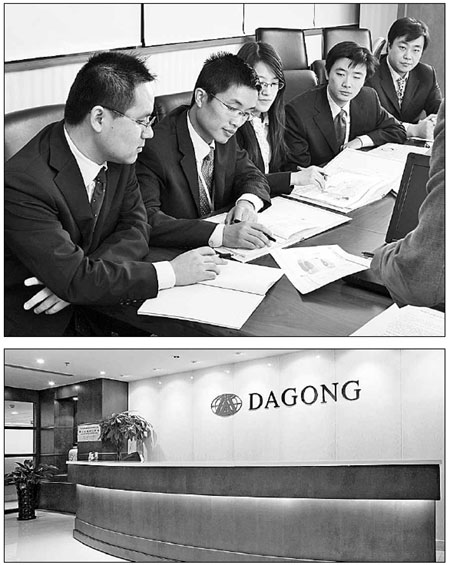New global credit rating agency
Updated: 2013-09-16 08:16
By Wei Tian in Shanghai (China Daily)
|
|||||||||||
Consortium with 'big three' in its sights will boost competition in the sector
The opening of a new global credit rating agency, one of whose co-founders is Chinese, has been welcomed by a former senior World Bank vice-president, who says it will be an "invaluable asset" that can take on companies which now dominate the global industry.
Experts also see the new agency, Universal Credit Rating Group, as growing evidence of a determination to boost Chinese influence on the global credit ratings system on the back of its growing economic and financial power.
"Any development that can elicit more competition and generate a greater number of actors in the rating agency field is welcome," says the former senior World Bank vice-president, Ana Palacio, who is also a former foreign minister of Spain.
UCRG, a consortium of China's biggest ratings agency, Dagong Global Credit Rating Co Ltd, Egan-Jones of the United States and RusRating of Russia, began operations in Hong Kong in late June.
Moody's Investors Service, Standard & Poor's Ratings Services and Fitch Ratings control 95 percent of the global ratings market, but some of their performances during the financial crisis have eroded trust in the way they work and raised questions about their potential to undermine state sovereignty.
UCRG's ability to attract widespread business hinges on whether it can conform to the "non-sovereign principle" and demonstrate that it is "universal" as it claims, and not just the joint product of its three co-founders, Palacio says.
"As a European, I consider it imperative that the continental point of view be represented in this universal platform as well."
UCRG's chairman is Guan Jianzhong, chairman of Dagong, and its chief executive is Richard Hainsworth, the founder of RusRating.
A statement issued at a news conference in Beijing last October announcing the establishment of UCRG says its mission is to "construct a new credit ratings system within five years".
Hainsworth says then: "It will be a multilateral, independent, and international credit ratings agency comprised of private organizations whose responsibilities do not conflict with the ratings and do not represent the interest of any particular country or group."
The new ratings are not intended immediately to replace the old system dominated by Moody's, Standard & Poor's and Fitch, but to provide investors with more choices, Guan says.
Sean Egan, the president of Egan-Jones, says UCRG's near-term goal is to supplement the current ratings system.
"The current system is New York-centered. UCRG will bring the perspective of China and Russia to the table. That means UCRG will get different rating results from the big three," he says.
The new company is also willing to bring in new partners from different countries, he adds.
Dozens of companies have expressed interest in taking part, Guan says, but the "Big Three" will not be considered for membership because of a "divergence in principles and positions".
Hainsworth says the group will use a "dual credit rating system" that will let investors compare debt issuers both locally and globally.
"When you compare two companies within one country, a local member of the UCRG is able to do the job. But when comparing companies on a global level, for instance to compare an oil company in India and another one in Milwaukee, you'll need a global comparability. That's when UCRG will play a role," he says.
Fan Mingtai, head of the department of quantitative finance with the Chinese Academy of Social Sciences, a think tank, says a new force is needed to balance the global credit rating system.
If such a non-Western system could be established, it will first be accepted by the emerging markets, then may gain popularity in European and US markets, he says, adding that it is "essential for the new agency to develop its own rating theory and assessment indicator system".
"A system with no unique features wouldn't be much different from the old one and won't be accepted by authorities and investors."
Palacio says: "The key issue, in my opinion, is the ability of UCRG to garner the necessary level of trust as well as a solid stock of clients in order to attest to the acceptance of mainstream investors."
Above and beyond the need for more actors, it is essential to achieve greater transparency on methodology and pricing policy, boost independence and mitigate conflicts of interest, he says.
"These parameters would largely determine UCRG's reception in Europe, which has already taken steps to increase competition in the ratings market and break the virtual oligopoly of the Big Three."
On June 6, Dagong's European office became the first Asian credit rating agency to be approved by the European Securities and Markets Authorities for running credit rating businesses in Europe, allowing Dagong Europe to provide services in 27 EU member states.
Guan says: "China, as a major international creditor and an increasingly important global investor, needs to have its own credit rating agencies to provide reliable credit rating information in order to protect the creditor's interests.
"Meanwhile, the EU, as the world's biggest economy, possesses huge market demand for more comprehensive rating information, especially after the existing rating system failed to warn of the crisis."
weitian@chinadaily.com.cn
|
Experts see Universal Credit Rating Group, a consortium that includes China's biggest ratings agency Dagong Global Credit Rating Co Ltd, as growing evidence of a determination to boost Chinese influence on the global credit ratings system. Photos Provided to China Daily |
(China Daily 09/16/2013 page17)
Today's Top News
World Bank shares green path with China
More foreigners get green cards
FM hails US-Russia deal
Stranded cruise guests flown home
Fallen celebrity blogger says Net needs cleanup
Request for blood of female virgins misread
College students face tougher English tests
Wushu proposed as school sport
Hot Topics
Lunar probe , China growth forecasts, Emission rules get tougher, China seen through 'colored lens', International board,
Editor's Picks

|

|

|

|

|

|






